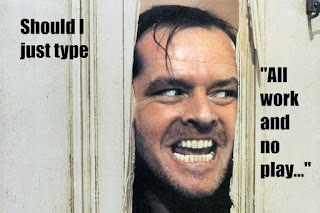Putting the "No" in NaNoWriMo--But Getting Your Novel Done Anyway by Dean Gloster
I
love the idea of NaNoWriMo, National
Novel-Writing Month, which encourages us to write 50,000 words in the 30 days
of November. That’s an impressive chunk of a book, enough heft to provide the
momentum to keep going. And the rush of pushing through resistance to surf a
torrent of words sounds breathtaking.
Not that I’ve ever
experienced it.
In
reality, I find every November a painful avalanche of fist-sized rocks bounding
downhill at my already-dented writer’s self-image. By mid-month, everyone else
is all, “I wrote 29,000 words!” “I’m at 38k!” “I wrote a fantasy trilogy and a
prequel! But they’re in Kingon.” while I just mumble, “Uh, I rewrote my first
two chapters in first-person present.” (It’s still not right.)
(I'm participating in the more popular "National Novel Writing Decade")
So
while everyone else is crowing about their word count this month, I feel like
that one out-of-place penguin at a convention of flying birds: They’re all
urging me to soar, and telling me it’s not that hard, while I look down at my
stubby flippers and think, “I might be designed for a different approach.”
It’s
possible that I just don’t get NaNoWriMo, despite admiring the idea. My
internal editor is a vicious thug, and the best I can currently work out with
him is an uneasy truce: He gets out of the way only briefly, for parts of the
first draft, and then piles on during revision.
The
truth is, there are lots of ways to write a novel, and many of them don’t
involve 50,000 words in one month. I’m trying to find a sustainable pace and
process for writing—more of a marathon pace than a one-month sprint. That’s
part of the difficulty in being a writer: You have to figure out your story,
learn your craft, and also find—through trial and error—the process that works
for you.
While
I don’t have 50,000 words of advice (or of anything else) this month, I do have
some process suggestions of things that sometimes work for me. One or two might work for you, too.
Sometimes write by hand. When I write
longhand, I know it’s a draft—just playing—not something I’m typing in the
document, so that frees me a little from my cranky internal editor.
Start with the raisins, before the oatmeal.
Do some of the fun stuff first. For me, that’s the jokes and the dialogue.
Later, I can fill in the rest of the scene.
When you’re stuck, use the “one-inch frame.”
I got this advice from Anne Lamott’s wonderful book on writing, Bird by Bird. Reduce the scope of what
you’re trying to do to a small thing—the transition to the next scene, the
paragraph describing the setting, the dialogue where the characters are talking
past each other.
Edit yesterday’s pages before going on to
today’s. This advice, of course, is anathema to the hot first draft notion
of NaNoWriMo, but writer M.T. Anderson advises doing it anyway. Editing is
easier than writing, and starting there helps you overcome the resistance to
writing by sneaking into it: You revise yesterday’s pages, and by the time you’re
done doing that, your head is in the book again, constructing what’s next. It
seems to work pretty well for M.T. Anderson, what with the National Book Award, and all.
Write in 40-minute sprints. When you
can, it’s helpful to write in 40-minute sprints: That’s long enough to push
through resistance and get something done, but not so long that it seems
interminable. Then repeat.
Get away from the Internet. That’s good
advice generally, but especially in
2017, where it’s easy to get wrapped around the axel of the news cycle before
eight in the morning and then spend the rest of the day rotating helplessly in
a useless jabbering rage. Don’t. Not if you also want to be productive. Channel
that anxiety into art and activism, not an endless cycle of freak out and
distraction.
There's a room in
our house where the wi-fi signal doesn’t reach, and I take my laptop there to
write. There are also software solutions that will keep you off the Internet
for timed periods.
However you do it, find your way to write, which may not be 50,000 words in one month. And be kind and compassionate to yourself. Writing is hard for everyone I
know.
Do
you have a process tip to pass along? Share it with us in the comments. Write
on, friends.
Dean
Gloster graduated with an MFA in writing for children and young adults from
Vermont College of Fine Arts in July 2017. He is a former stand-up comedian and
a former law clerk at the U.S. Supreme Court. His debut YA novel DESSERT FIRST
is out now from Merit Press/Simon Pulse. School Library Journal called it “a sweet, sorrowful, and simply divine
debut novel that teens will be
sinking their teeth into. This wonderful story…will be a hit with fans
of John Green's The Fault in Our Stars
and Jesse Andrews's Me and Earl and the
Dying Girl.” Your word count is bigger than his.






Someone once told me we all need an inner defense attorney to counter the inner prosecutor that jumps up when we try to be creative. I really like the Thomas Mann quote.
ReplyDeleteSimply brilliant! Thanks for this post. I enjoyed the quotes, too. I hadn't heard many of these before but all resonated.
ReplyDeleteGreat post and advice. Love the bit about the penguin!
ReplyDeleteGreat post, Dean. I have never done NaNoWriMo either.
ReplyDeleteI have a great deal to say on this subject but first I have to get dressed. I will leave with this for now and no doubt you've heard it before: There are three rules to writing a best seller. Unfortunately, nobody knows what they are!
ReplyDelete